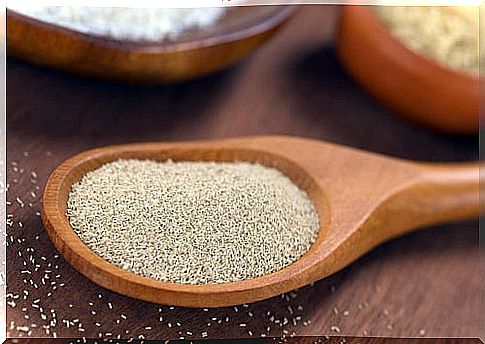Properties Of Brewer’s Yeast
Do you know the properties of brewer’s yeast? It comes from the unicellular fungus Saccharomyces cerevisiae, a microorganism that is used both in the manufacture of beer and in products such as bread and wine.
It is obtained from the fermentation of cereals such as barley or wheat thanks to the aforementioned microorganism. Then, to be marketed in flakes, powder or compromises, the resulting product is dried, cleaned and pasteurized. Find out more below.
Nutritional properties of brewer’s yeast
According to a publication in the Health Encyclopedia , University of Rochester Medical Center, brewer’s yeast is a product with an interesting concentration of nutrients. Specifically, 52% of its weight is made up of protein.
It also represents an important source of B-complex vitamins, including:
- Thiamine (B1)
- Riboflavin (B2)
- Niacin (B3)
- Pantothenic acid (B5)
- Pyridoxine (B6)
- Folic acid (B9)
- Biotin (B7)
On the other hand, according to this same text, its mineral content can be controlled by adding minerals to the solution in which it is grown. Thus, adding chromium increases its chromium content or incorporating selenium increases its selenium content. Other minerals in this product include potassium, zinc, iron, and magnesium.
Properties of brewer’s yeast

Due to its significant concentration of essential nutrients, brewer’s yeast has been studied as a possible supplement to promote health and reduce the risk of disease. Despite the findings of some studies, the evidence is still limited and therefore should be used with caution.
Supports the functions of the immune system
The nutrients contained in brewer’s yeast contribute to modulating the functions of the immune system. According to a rodent study published in the Egyptian Journal of Immunology , supplementation with brewer’s yeast improves basal immune responses and contributes to a better quality of life.
Helps control high blood pressure
Although there are many factors involved in the control of high blood pressure, brewer’s yeast has shown positive effects in its reduction, especially in individuals who also have type 2 diabetes. This was shown by a study published in the Iranian Journal of Public Health , which concluded that:
Has antimicrobial and probiotic properties
Brewer’s yeast (Saccharomyces cerevisiae), like other types of yeast, have been investigated for their probiotic and antimicrobial potential. In turn, these properties have allowed us to observe another series of health benefits.
Coinciding with data from research published in the journal Frontiers in Microbiology , this type of yeast acts as a probiotic and contributes to the prevention and treatment of various types of gastroenteritis in children and adults; in particular, it could favor the treatment of diarrhea.
How should you take brewer’s yeast?
To take advantage of the properties of brewer’s yeast, it can be purchased in any of its commercial presentations: powder, flakes, liquids, tablets, among others. The average dose for adults is one to two tablespoons per day.
However, given the lack of evidence on its efficacy and safety, it is best to consult your doctor or nutritionist before taking it as a supplement.
Adverse effects of brewer’s yeast

Moderate consumption of brewer’s yeast does not pose a health risk. However, it is important to consider that it can interact with some medications. Therefore, before taking this supplement, it is advised to consult your doctor.
Your healthcare professional will likely advise taking small doses to determine how well it is assimilated. Also, you will be careful in special conditions such as:
- Intake of medications such as monoamine oxidase inhibitors, meperidine, and drugs for diabetes.
- Crohn’s disease
- Frequent yeast infections
- Yeast allergies
- Weakened immune system
Have you already checked for yourself the properties of brewer’s yeast? If you have no problem adding it to your diet, don’t hesitate to choose it as a nutritional supplement.








